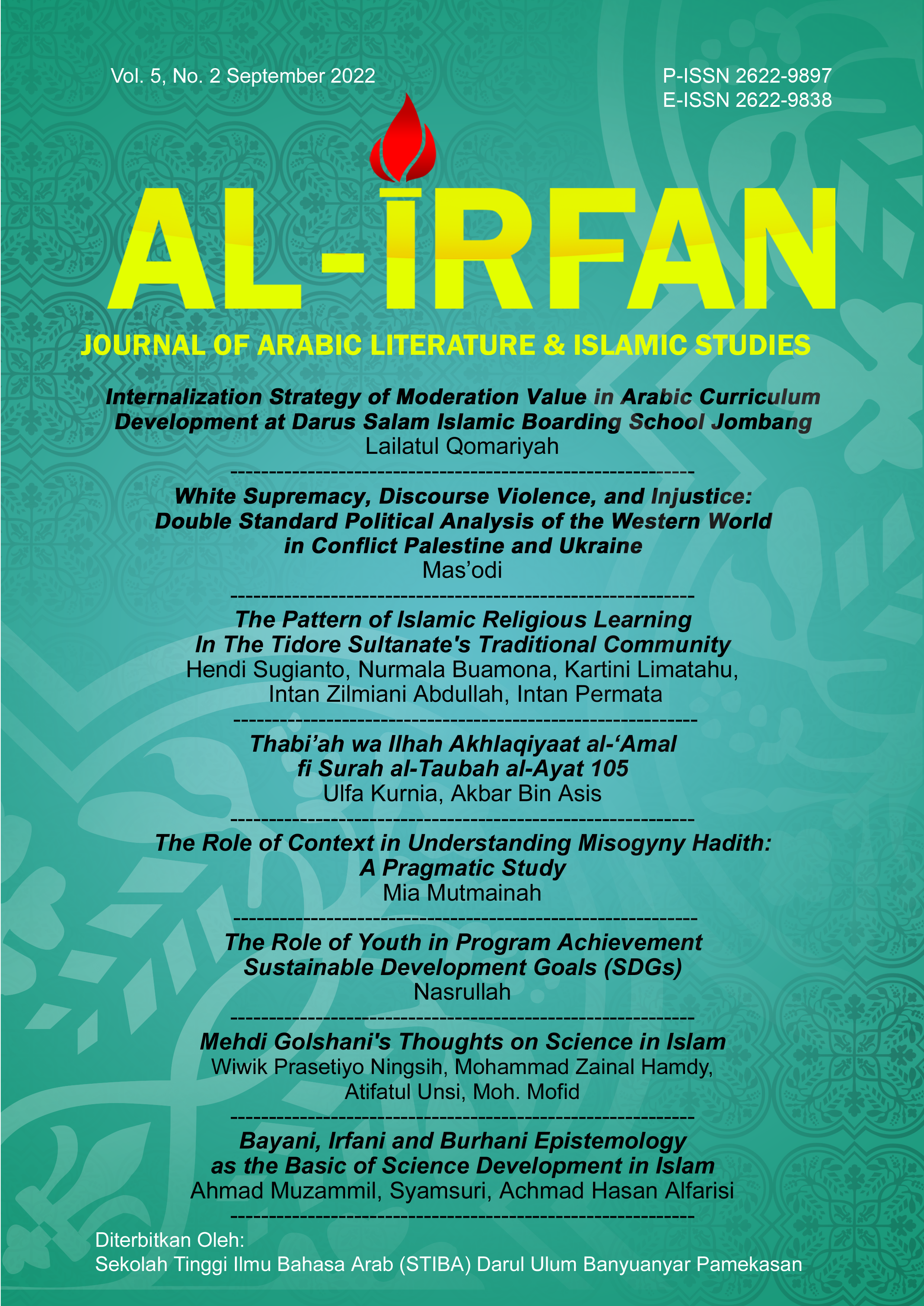Hakekat dan Urgensi Etos Kerja dalam QS. At-Taubah Ayat 105
DOI:
https://doi.org/10.36835/alirfan.v5i2.5764Kata Kunci:
etos kerja, Al-Qur’an, at-TaubahAbstrak
The discussion contained in this thesis is the view of the Koran on work ethic which is focused on QS al-Taubah/9: 105, with this writing in the study of interpretation it can provide understanding for the community to do a good job. This study uses a qualitative literature research method using an interpretive and sociological approach. Then the data collection used is the library method that comes from primary and secondary data. After the data has been collected, it is then carried out with data processing using the Tamm interpretation pattern. Furthermore, the data were analyzed using descriptive, verification and argumentative. The results of this study are, in the work ethic of QS al-Taubah/9:105, the essence is understanding the work ethic which is indeed a command from God to work with enthusiasm, motivation and sincerity based on Islamic law. Then the urgency, that is, it contains an order or obligation for every human being to do work, that work is worship and a mandate from Allah, fosters movement of activities that make it grow, and causes shame in oneself if you don't do a good job.Referensi
Al-Marägi, A. M. (2002). Terjemahan Tafsir Al-Maragi (PT. K. T. Putra, Ed.; Juz 10).
Al-Thabari, I. J. (n.d.). Tafsir Ath-Thabari diterjemahkan dalam Bahasa Indonesia (Jilid 15). Pustaka Azzam.
Al-Zuhaifi, W. (n.d.). Tafsir al-Munïr; fi al- ’Aqïdah, wa al-Syar ’iyah, wa al-Manhaj, diterjemahkan dalam bahasa Indonesia, Tafsiral-Munir; Akidah, Syari’ah, Manhaj (Jilid 5).
Asis, A. Bin. (2020). Pandangan Al-Qur’an Tentang Etos Kerja. In Skripsi UIN Alauddin Makassar. UIN Alauddin Makassar.
Hamdy, M. Z. (2020). TELAAH KEMBALI PEMAHAMAN SISTEM KETATANEGARAAN DALAM ISLAM ( KHILAFAH ) ( Kajian historis dan ideologis terhadap gerakan HTI di Indonesia ). Syaikhuna: Jurnal Pendidikan Dan Pranata Islam, 11(October), 158–172. https://doi.org/https://doi.org/10.36835/syaikhuna.v11i2.4013
Hamka. (1965). Tafsir Al-Azhar. Pustaka Nasional PTE LTD.
Hamka. (2015). Tafsir Al- Azhar (Jilid 4). Gema Insani.
Irham, M. (2014). Etos Kerja Perspektif Islam. Jurnal Substansia, 14(1).
Khaeruman, B. (2004). Memahami Pesan Al-Qur’an (Kajian Tekstual dan Kontekstual). Pustaka Setia.
Luth, T. (2001). Antara Perut dan Etos Kerja dalam Perspektif Islam. Gema Insani Press.
Madjid, N. (1992). Islam Doktrin dan Peradaban. Paramadina.
Muhammad bin Ali Asy-Syaukâni. (n.d.). Fath Al-Qadr al-Jãmi’ Baina Fanni Ãr-Riwãyah Wa Ad-Dirãyah Min Tafs7r. Terjemahan dalam Bahasa Indonesia TafsirFathul Qadir (Jilid 4). Pustaka Azzam.
Murthahari, M. (2003). Memahami Keunikan Al-Qur’an, Penerjemah Irman Abdurrahman. Pustaka Intermasa.
Purnama, C. (n.d.). Etos Kerja Islam dalam Meningkatkan Kemampuan Usaha. In Academia Edu. STIE Al-Anwar.
RI, D. A. (2014). Al-Qur’an dan Terjemahannya (Cet. XXI). Pt. Balai Pustaka.
Rohim, F. A. (2001). Bimbingan Konseling dalam Islam. UII Press.
Saifullah. (2010). Etos Kerja dalam Perspektif Islam. Jurnal Sosial Humaniora, 3(1).
Sinamo, J. H. (2008). Etos Kerja Profesional. Pt. Malta Printindo.
Tasmara, T. (2002). Membudayakan Etos Kerja Islami. Gema Insani.
Thabarani, S. A. (1994). Al Mu’jam Al Kabir. Maktabah Ibn Taimiyah.
Wijaya, A. (2009). Arah Baru Studi Ulum al-Qur’an: Memburu Pesan Tuhan di Balik Fenomena Budaya. Pustaka Pelajar.
##submission.downloads##
Diterbitkan
Cara Mengutip
Terbitan
Bagian
Lisensi
Hak Cipta (c) 2022 Ulfa Kurnia, Akbar Bin Asis

Artikel ini berlisensi Creative Commons Attribution 4.0 International License.
Lisensi :
Al-Irfan: Journal of Arabic Literature and Islamic Studies is published under conditions Creative Commons Attribution 4.0 International License / CC BY 4.0 This license permits anyone to copy and redistribute this material in any form or format, modify, modify, and make derivative works of this material for any purpose, including commercial purposes, so long as they credit the author for the original work.











